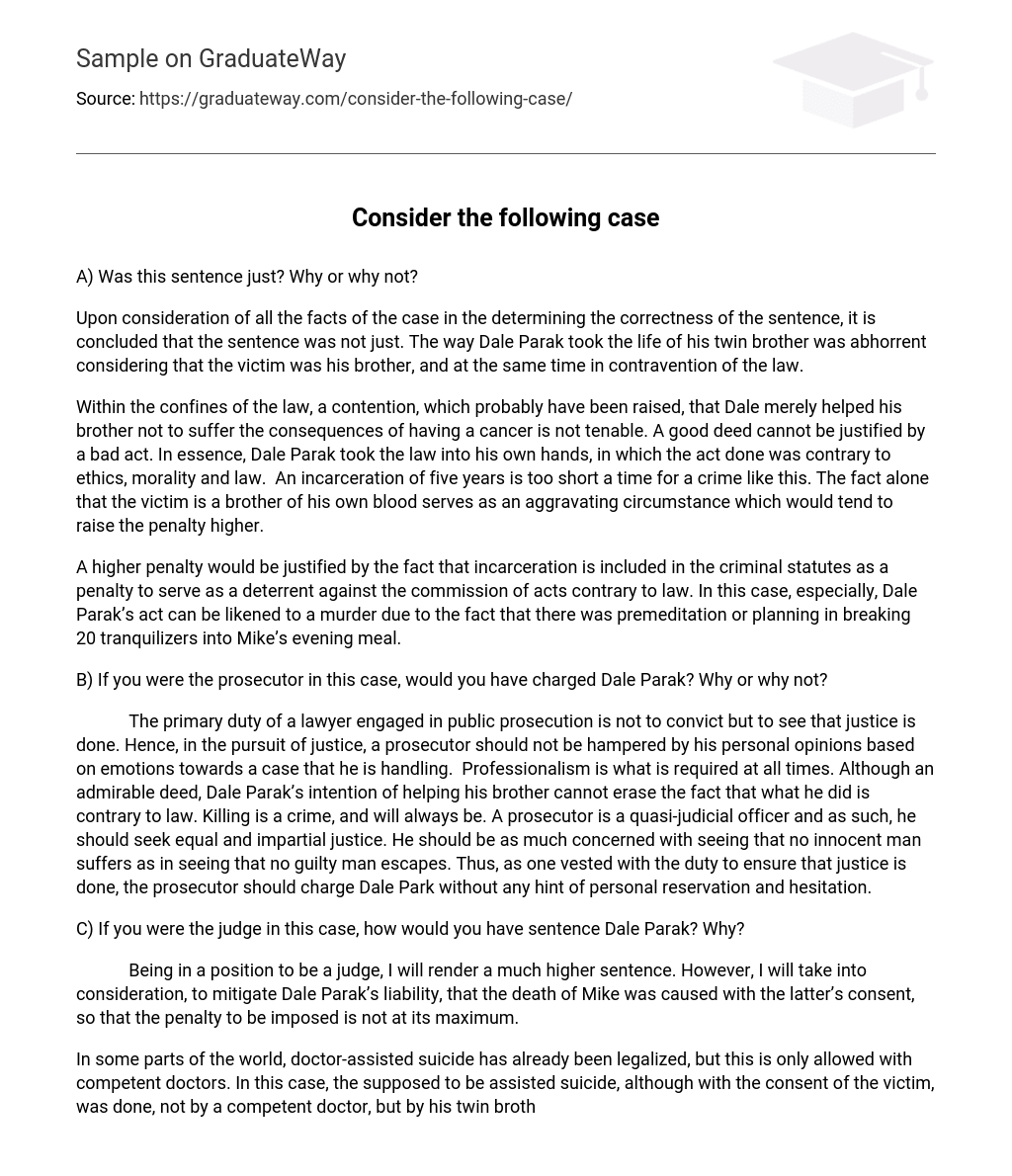A) Was this sentence just? Why or why not?
Upon consideration of all the facts of the case in the determining the correctness of the sentence, it is concluded that the sentence was not just. The way Dale Parak took the life of his twin brother was abhorrent considering that the victim was his brother, and at the same time in contravention of the law.
Within the confines of the law, a contention, which probably have been raised, that Dale merely helped his brother not to suffer the consequences of having a cancer is not tenable. A good deed cannot be justified by a bad act. In essence, Dale Parak took the law into his own hands, in which the act done was contrary to ethics, morality and law. An incarceration of five years is too short a time for a crime like this. The fact alone that the victim is a brother of his own blood serves as an aggravating circumstance which would tend to raise the penalty higher.
A higher penalty would be justified by the fact that incarceration is included in the criminal statutes as a penalty to serve as a deterrent against the commission of acts contrary to law. In this case, especially, Dale Parak’s act can be likened to a murder due to the fact that there was premeditation or planning in breaking 20 tranquilizers into Mike’s evening meal.
B) If you were the prosecutor in this case, would you have charged Dale Parak? Why or why not?
The primary duty of a lawyer engaged in public prosecution is not to convict but to see that justice is done. Hence, in the pursuit of justice, a prosecutor should not be hampered by his personal opinions based on emotions towards a case that he is handling. Professionalism is what is required at all times. Although an admirable deed, Dale Parak’s intention of helping his brother cannot erase the fact that what he did is contrary to law. Killing is a crime, and will always be. A prosecutor is a quasi-judicial officer and as such, he should seek equal and impartial justice. He should be as much concerned with seeing that no innocent man suffers as in seeing that no guilty man escapes. Thus, as one vested with the duty to ensure that justice is done, the prosecutor should charge Dale Park without any hint of personal reservation and hesitation.
C) If you were the judge in this case, how would you have sentence Dale Parak? Why?
Being in a position to be a judge, I will render a much higher sentence. However, I will take into consideration, to mitigate Dale Parak’s liability, that the death of Mike was caused with the latter’s consent, so that the penalty to be imposed is not at its maximum.
In some parts of the world, doctor-assisted suicide has already been legalized, but this is only allowed with competent doctors. In this case, the supposed to be assisted suicide, although with the consent of the victim, was done, not by a competent doctor, but by his twin brother. Dale Parak was a private individual having no competency in determining the lucidity of Mike’s mind when they made the decision to commit suicide; hence, there is a possibility that Dale could have acted on a misapprehension.
As it is a judge’s sworn duty to be faithful to the law and maintain professional competence, it is required of him to follow what penalty the law provides, but should take into consideration the factors that will give to Dale Parak a not too excessive penalty. And upon the determining the real facts, he should then apply the law, without fear of any adverse opinion of criticism, and decide the case impartially on the basis of the evidence presented without regard for his own personal opinion towards Dale Parak’s innocence or guilt.
D) What would be an appropriate punishment in this case? Why?
The appropriate punishment would be the penalty provided by law, while taking into consideration all circumstances that tend to mitigate or aggravate the penalty to be imposed on him. Regarding the fact that Dale Parak based his actions on their joint decision with his twin brother of committing suicide and his panicked state when he shot Mike could somehow mitigate the penalty to be imposed on him.
However, within the moral perspective, attempted suicide is sometimes referred to as voluntary euthanasia; and the latter is usually seen as a type of murder. Thus, when a suicide is planned, it is likened to a premeditated murder in which the law places a higher penalty when committed. Therefore, Dale Parak’s action, as seen through the eyes of the law, is murder. Being so, the imposition of a higher penalty of more than the five years previously imposed is fitting in this case.





